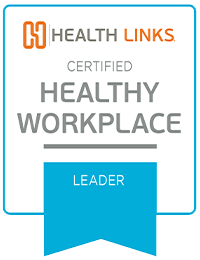
Comcast, a global media and technology company, is getting creative in supporting workplace mental health. The organization won the 2023 Health Links® Workplace Mental Health Champion Award in recognition of its impressive approach to employee mental health. We spoke with Kyle Vogel, Comcast’s Environmental, Health, and Safety Director for the Mountain West Region and Kristen Bullock, ASP, Manager of Environment, Health & Safety for Comcast’s Mountain West Region.
In the following Q&A, Vogel and Bullock illuminate how Comcast addresses employee mental health and how the company puts its people first. We encourage you to explore Comcast’s integrated approach to Total Worker Health® and use it to inspire your own workplace mental health efforts.
Bullock: It’s creating a safe work environment where people feel valued. Employees don't feel like they need to be perfect, which turns into employee loyalty and mutual respect.
Vogel: It's part of creating retention in your workplace, helping with productivity, and being a desirable place to work so you can recruit the best talent. When you look at our current workforce, that's something especially young workers really value, even more so than compensation in some cases.
Vogel: This is where we really follow the Total Worker Health model. Our leadership team embraced this idea and trusted us to do what’s best for our employees. If we're caring for the physical well-being of our people, they're able to show up to work more confident, healthy, and safe. When we spend time taking care of employee well-being, they’re able to show up less stressed, less distracted, and more likely to work safely.
We always encourage our employees to maximize our benefits and perks. With our offerings and flexibility – we give them [paid] time and space to go to the doctor, get checkups, and stay healthy. They may also be able to maintain a healthy body if we can encourage them to choose healthy food options by providing educational resources on packing a well-balanced lunch or going to a restaurant with healthy options when they're out in the field. Additionally, if they’re able to maintain a healthy body they’re more likely to be able to stay safe when climbing ladders or performing other strenuous tasks in the field.
Bullock: We started to change the focus during the COVID-19 pandemic when it was evident that people were really struggling. We went from offering 10 free counseling sessions a year to 20 (per issue) through our Employee Assistance Program. Additionally, we introduced a mental health application as an employee benefit.
Bullock: We encourage employees to use all the different types of activities available in the app. Having the availability at their fingertips to do things like meditate even if they only have three minutes has been huge. I’ve heard all good things and continue to receive especially good feedback surrounding the sleep stories. Personally, they have been really beneficial to help quiet my mind.
Vogel: We offer the app to employees’ families as well. Each employee can share their subscription with up to four family members. So, an employee might not use it, but their spouse, parents, or kids might love it. I think that helps care for our employees when we're caring for their families.
Bullock: We have a corporate wellness champion group – totaling 236 employees – that helps promote all our wellness activities and benefits. Often, our leaders have been honest about their own mental health stories and times in their lives where they needed assistance. This vulnerability has been beneficial. It reminds our employees that it’s okay to need help, everyone does.
Vogel: We invest in our employees’ health and wellness through many of our perks and benefits. To ensure they take advantage of these benefits and other health and financial resources, we often have health and wellness events where we invite benefit providers, nutritionists, and other speakers to share their expertise. Our leaders and well-being champions encourage their teams to embrace and take advantage of these resources and opportunities.
Bullock: I think the advising sessions because they keep me on track and thinking outside the box. I've always liked hearing about what other organizations are doing. I find them inspiring and, it just gets my mind thinking.
Vogel: I love that Health Links has so many companies that are also sharing their experiences with your advisors. You're crowd-sourcing best practices by having those advising sessions.
The annual awards have been helpful in getting recognition for the accomplishments that we're making. As a company, it’s helped our employees and leaders understand and appreciate that what we're doing is unique and that we’re recognized in our community as a leader in employee health and well-being.
Vogel: Talk to community organizations like Health Links to help you get started, especially if it seems like a daunting task and you don’t have a playbook to follow. Consider the longer-term benefits of implementing these programs. You might not get that return on investment in the first year that you start offering new benefits or programs, but trust that over time you're going to see the impact it's making on your employees. That's the point of making these investments and showing your team that you care for them.




